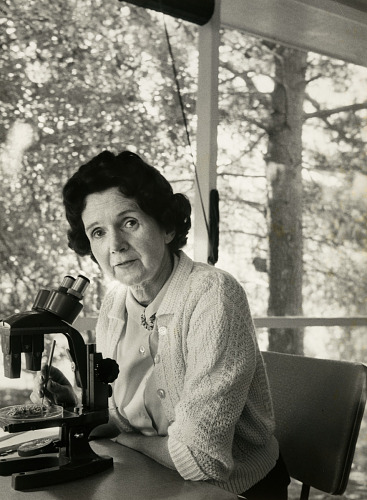This year for Women’s History Month, we want to highlight women who have impacted the daily lives of Pennsylvanians and improved our world.
Rachel Carson was a writer and environmentalist born in the small town of Springdale, Pennsylvania. Her impact on the world of environmentalism is still felt today, and her pioneering work in the field helped to launch the modern environmental movement. As we celebrate Women’s History Month, we want to recognize her remarkable achievements and significant impact on history.
Carson is best known for her book “Silent Spring,” which was published in 1962. The book is a powerful critique of pesticides’ indiscriminate use and harmful effects on the environment and human health. It helped launch the modern environmental movement and inspired a new wave of activism and concern for the health of our planet.
Before “Silent Spring,” Carson was already an accomplished writer and scientist. She won the Pulitzer Prize in 1952 for her book “The Sea Around Us,” which explores the mysteries and wonders of the ocean. Her writing was known for its lyrical beauty and ability to capture the awe-inspiring complexity of the natural world.
“Eventually man, too, found his way back to the sea. Standing on its shores, he must have looked out upon it with wonder and curiosity, compounded with an unconscious recognition of his lineage. He could not physically re-enter the ocean as the seals and whales had done. But over the centuries, with all the skill and ingenuity and reasoning powers of his mind, he has sought to explore and investigate even its most remote parts, so that he might re-enter it mentally and imaginatively.”– Rachel Carson, The Sea Around Us
Carson’s work was groundbreaking because it challenged the prevailing attitudes of the time, which viewed the environment as a resource to be exploited for economic gain. Instead, she argued that we need to take a more holistic and compassionate approach to nature and that we need to recognize the interconnectedness of all living things.
Born and raised in Pennsylvania, Carson’s love for nature was shaped by the region’s rolling hills and lush forests. She attended college at nearby Chatham University and went on to work for the U.S. Fish and Wildlife Service in Pittsburgh. Her experiences in her home state helped shape her worldview and commitment to environmental protection.
Despite facing criticism and pushback from powerful interests, Carson continued to speak out for the environment and to advocate for a more sustainable and compassionate approach to nature. Her work inspired a new generation of environmental activists and helped lay the foundation for many of the environmental protections we take for granted today.
“Never silent herself in the face of destructive trends, Rachel Carson fed a spring of awareness across America and beyond. A biologist with a gentle, clear voice, she welcomed her audiences to her love of the sea, while with an equally clear determined voice she warned Americans of the dangers human beings themselves pose for their own environment. Always concerned, always eloquent, she created a tide of environmental consciousness that has not ebbed.” – President Jimmy Carter, remarks from the Presidential Medal of Freedom Presentation Ceremony
Rachel Carson passed away in 1964, but her legacy lives on. Her pioneering work in environmentalism and her impact on Pennsylvania’s history serves as a reminder of the power of one person to make a difference. As we celebrate Women’s History Month, we are inspired by Rachel Carson and her commitment to protecting the planet and promoting a more sustainable and compassionate world.

A reading list from Rachel Carson
- Under the Sea-Wind
- 208 pages
- Originally published in 1941
- The Sea Around Us
- 288 pages
- Originally published in 1951
- The Edge of the Sea
- 304 pages
- Originally published in 1955
- Silent Spring
- 400 pages
- Originally published in 1962
- The Sense of Wonder
- 112 pages
- Originally published in 1965
- Lost Woods: The Discovered Writing of Rachel Carson
- 288 pages
- Originally published in 1998
Women’s History Month
Women’s History Month was established in 1981 as a national celebration, with Congress passing Pub. L. 97-28 authorizing the President to designate the week beginning March 7, 1982, as “Women’s History Week.” Congress continued to pass joint resolutions over the next five years, designating a week in March as “Women’s History Week.” In 1987, Congress passed Pub. L. 100-9 after being petitioned by the National Women’s History Project, officially designating March 1987 as “Women’s History Month.” From 1988 to 1994, Congress passed additional resolutions requesting and authorizing the President to declare March of each year as Women’s History Month. Since 1995, each year, Presidents have issued proclamations recognizing and celebrating the contributions women have made to the United States and highlighting the specific achievements women have made in various fields throughout American history.
Learn more at WomensHistoryMonth.gov.
